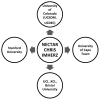Innovations to enhance the quality of health professions education at the University of Zimbabwe College of Health Sciences--NECTAR program
- PMID: 25072588
- PMCID: PMC4174276
- DOI: 10.1097/ACM.0000000000000336
Innovations to enhance the quality of health professions education at the University of Zimbabwe College of Health Sciences--NECTAR program
Abstract
The University of Zimbabwe College of Health Sciences (UZCHS) is Zimbabwe's premier health professions training institution. However, several concerns were raised during the past decade over the quality of health education at UZCHS. The number of faculty and students declined markedly until 2010, when there was a medical student intake of 147 while the faculty comprised only 122 (39%) of a possible 314 positions. The economic and political crises that the country experienced from 1999 to 2009 compounded the difficulties faced by the institution by limiting the availability of resources. The Medical Education Partnership Initiative funding opportunity has given UZCHS the stimulus to embark on reforms to improve the quality of health education it offers. UZCHS, in partnership with the University of Colorado School of Medicine, the University of Colorado Denver Evaluation Center, and Stanford University, designed the Novel Education Clinical Trainees and Researchers (NECTAR) program to implement a series of health education innovations to meet this challenge. Between 2010 and 2013, innovations that have positively affected the quality of health professions education at UZCHS include the launch of comprehensive faculty development programs and mentored clinical and research programs for postgraduate students. A competency-based curriculum reform process has been initiated, a health professions department has been established, and the Research Support Center has been strengthened, providing critical resources to institutionalize health education and research implementation at the college. A core group of faculty trained in medical education has been assembled, helping to ensure the sustainability of these NECTAR activities.
Figures

References
-
- Davidson L. Birmingham's baby:the beginning of medical education in Rhodesia. Med Educ. 1971;5(1):61–74. - PubMed
-
- Mullan F, Frehywot S, Omaswa F, Buch E, Chen C, Greysen SR, et al. Medical schools in sub-Saharan Africa. Lancet. 2011;377(9771):1113–21. - PubMed
-
- Ramani S, Leinster S. AMEE Guide no. 34: Teaching in the clinical environment. Med Teach. 2008;30(4):347–64. - PubMed
-
- Sub-Saharan FAIMER Regional Institute. [Accessed April 17, 2014]; www.safri.faimerfri.org.
Publication types
MeSH terms
Grants and funding
LinkOut - more resources
Full Text Sources
Other Literature Sources
Medical
Miscellaneous

